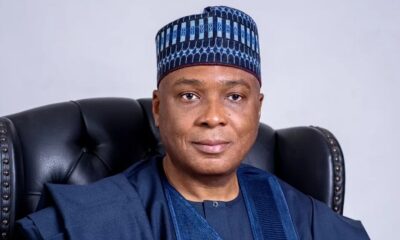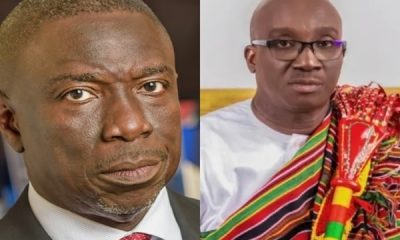Economy
CBN blames ageing pipelines for oil revenue crash

The Central Bank of Nigeria has attributed the significant decline in oil revenue for the third quarter of 2024 to ageing pipeline infrastructure and operational inefficiencies.
According to the apex bank’s latest economic report for the third quarter of 2024, oil revenue fell by 24.72 per cent to N1.30tn compared to the second quarter of 2024.
This drop was largely due to lower receipts from petroleum profit tax and royalties.
Also, the revenue figure fell short of the quarterly target by 75.39 per cent, primarily due to frequent shut-ins caused by deteriorating pipelines and installations.
The report read, “Oil revenue, however, fell by 24.72 per cent to N1.30tn, relative to the level in Q2 2024 on account of lower receipts from petroleum profit tax and royalties.
“It was also 75.39 per cent short of the quarterly target due to shut-ins, arising from ageing oil pipelines and installations.”
It also noted that despite a modest increase in crude oil production to 1.33 million barrels per day from 1.27 mbpd in the preceding quarter, challenges including theft, vandalism, and infrastructure deficits severely hampered Nigeria’s oil revenue performance.
The ageing infrastructure not only reduced efficiency but also undermined the country’s ability to meet its OPEC production quota.
The report noted that global factors further compounded the situation, as the average spot price of Nigeria’s Bonny Light crude fell by 5.45 per cent to $82.23 per barrel during the quarter, reflecting subdued demand in the global market.
Similar declines were observed in other crude benchmarks, including Brent and the OPEC Reference Basket.
While the oil sector struggled, the Nigerian economy recorded growth of 3.46 per cent in Q3 2024, up from 3.19 per cent in the second quarter, driven largely by the non-oil sector, which contributed 3.18 percentage points to total GDP growth.
The oil sector’s growth slowed to 5.17 per cent year-on-year, compared to 10.15 per cent in the previous quarter, as operational inefficiencies and declining crude oil prices took a toll.
The fiscal implications were significant, with federally collected revenue falling 23.71 per cent short of the budget benchmark, despite a 7.48 per cent quarter-on-quarter increase.
The fiscal deficit, although narrowing by 22.51 per cent compared to the previous quarter, widened by 43.88 per cent relative to the quarterly target, reflecting ongoing fiscal pressures.
The report concluded that Nigeria’s goal of achieving an oil production target of 2mbpd by the end of 2024 remains under threat due to these challenges.
Economy
More Nigerians to experience poverty by 2027 – World Bank

The World Bank’s latest Africa’s Pulse report has projects a grim future for Nigeria, with poverty expected to rise by 3.6 percentage points by 2027.
Released during the IMF and World Bank Spring Meetings in Washington, DC, the report cites Nigeria’s reliance on oil, economic fragility, and governance challenges as key drivers.
It highlights the country’s structural economic weaknesses, dependence on oil revenues, and national fragility as key barriers to meaningful poverty reduction.
“Poverty in resource-rich, fragile countries, including large economies like Nigeria and the Democratic Republic of Congo, is projected to increase by 3.6 percentage points between 2022 and 2027,” the report stated.
Despite recent growth in Nigeria’s non-oil sector during the last quarter of 2024, the World Bank warns that this progress is unlikely to translate into widespread poverty alleviation due to ongoing fiscal and institutional challenges.
The report emphasizes that Sub-Saharan Africa remains the world’s poorest region, with an overwhelming 80% of the globe’s 695 million extreme poor residing there in 2024.
Within the region, half of the 560 million extremely poor people were located in just four countries, including Nigeria.
In stark contrast, South Asia accounted for 8% of the world’s extremely poor population, East Asia and the Pacific 2%, the Middle East and North Africa 5%, and Latin America and the Caribbean 3%.
The World Bank attributes the rising poverty in Nigeria and similar economies to weakening oil prices and fragile governance structures, noting: “This follows a well-established pattern whereby resource wealth combined with fragility or conflict is associated with the highest poverty rates, averaging 46% in 2024, which is 13 percentage points higher than in non-fragile, resource-rich countries.”
Meanwhile, non-resource-rich countries in Africa are experiencing stronger economic growth and faster poverty reduction, buoyed by high agricultural commodity prices and more resilient fiscal policies.
To reverse Nigeria’s downward poverty trend, the World Bank recommends reforms that prioritize inclusive economic growth and stronger public financial management.
It calls on the government to focus on “improving fiscal management and building a stronger fiscal contract with citizens to promote inclusive economic development and long-term poverty alleviation.”
Economy
SEE current exchange rate of the Dollar to Naira

What Is the Dollar to Naira Exchange Rate at the Black Market (Aboki FX)?
Here is the Dollar to Naira exchange rate at the parallel market, popularly known as the black market (Aboki fx), for Tuesday, April 23, 2025.
You can exchange your dollars for naira at the following rates:
Black Market Exchange Rate (Lagos – April 23, 2025):
According to sources at the Bureau De Change (BDC), the exchange rate at the Lagos parallel market saw traders buying at ₦1610 and selling at ₦1620 per US dollar.
It’s important to note that the Central Bank of Nigeria (CBN) does not recognize the black market. The CBN advises individuals seeking foreign exchange transactions to do so through their banks.
Dollar to Naira Exchange Rates
Market Type Buying Rate Selling Rate
Black Market ₦1610 ₦1620
CBN Official Rate ₦1591 (Low) ₦1606 (High)
Note: Forex rates vary across dealers and regions, and actual rates may differ from those listed.
Meanwhile, the Nigeria Customs Service (NCS) has announced the seizure of 298 smuggled items worth ₦7.6 billion between January and March 2025. The NCS also disclosed that it generated a total revenue of ₦1.75 trillion in the first quarter of the year.
Economy
Volvo announces termination of 800 U.S. workers, cites tariff, market decline

Volvo Group has announced plans to lay off up to 800 workers at three of its U.S. facilities over the next three months, citing ongoing market uncertainty and declining demand exacerbated by tariffs introduced under the administration of President Donald Trump.
The affected locations include the Mack Trucks plant in Macungie, Pennsylvania, as well as Volvo Group sites in Dublin, Virginia, and Hagerstown, Maryland.
In a statement on Friday, Volvo Group North America confirmed that between 550 and 800 employees would be impacted.
The company, a subsidiary of Sweden’s AB Volvo, employs nearly 20,000 people across North America.
The layoffs come amid wider turmoil in the automotive and manufacturing sectors, as shifting U.S. trade policy and a series of tariffs continue to drive up production costs. Economists have pointed to the uncertainty surrounding Trump’s trade strategy as a factor undermining both business and consumer confidence, with concerns mounting over a potential economic slowdown or recession.
According to Volvo, the company is grappling with a decline in heavy-duty truck orders, driven by instability in freight rates, anticipated regulatory changes, and the growing financial burden of tariffs. “We regret having to take this action, but we need to align production with reduced demand for our vehicles,” a company spokesperson stated in an email quoted by Reuters.
Volvo’s announcement marks another blow to an industry already navigating a complex web of supply chain challenges and fluctuating market conditions, with other manufacturers also warning of potential cost hikes and disruptions tied to global trade disputes.
-

 News15 hours ago
News15 hours ago2027: Pro-Fubara protesters want suspended Gov to run as Atiku’s VP(Video)
-

 Economy22 hours ago
Economy22 hours agoMore Nigerians to experience poverty by 2027 – World Bank
-

 News18 hours ago
News18 hours agoOborevwori /Okowa: PDP experiencing a rebirth and will soon bounce back-Saraki declares
-

 Politics22 hours ago
Politics22 hours agoLabour Party reaffirms Abure-led leadership after Supreme Court judgment
-

 News23 hours ago
News23 hours agoGovernor Oborevwori’s Defection: A Masterstroke That Handcuffs Delta’s Opposition
-

 News22 hours ago
News22 hours ago2027 done deal, more governors joining APC – Ganduje declares
-

 News16 hours ago
News16 hours agoEdo poll: How APC allegedly offered witnesses N30m bribe
-

 News15 hours ago
News15 hours agoFlights resume as NiMET unions suspend strike


















